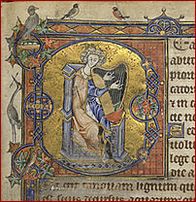I'm a person whose belief structure is faith-based. I remember absorbing the story of Doubting Thomas early in my childhood and deciding that I'd try to believe in and love God without human proof. Nonetheless, I always find myself intrigued by science which seems to support my faith. I have a love-hate relationship with such scientific findings: part of me revels in them, saying, "Ha! I knew it!!" while another part of me refuses to become emotionally invested--that way, I figure, if further investigation shows the science was faulty my relationship to God won't come tumbling down.
This week my husband, Rob, pointed me to the article "Can This Black Box See Into the Future?" from RedNova News, a science news web site. According to this article, Princeton University's Global Consciousness Project (GCP) has discovered some preliminary and tentative evidence that suggests all of humanity is joined through connections we don't understand--a global consciousness which some might call the mind of God.
As the article explains, scientists have discovered that a random event generator (REG--a computer which generates a random series of oughts and ones) spikes in a distinctly unrandom way just prior to large world events, such as 9/11, international Olympics events, Princess Diana's funeral, or the deep sea earthquake which caused the Asian tsunami. Furthermore, prayer and meditation groups are able to influence the pattern of events, too.
The effect is real, although no one knows quite what it means. It may mean "all of humanity shares a single subconscious mind that we can all tap into without realising" . . . that the "concentrated emotional outpouring of millions of people [may] be able to influence the output of [the main investigator's] REGs" . . . or it may be scientific foolsgold.
The Global Consciousness Project (GCP)--the chief investigating group--"is an international effort involving researchers from several institutions and countries, designed to explore whether the construct of interconnected consciousness can be scientifically validated through objective measurement." Princeton's webserver for the project is the aptly named noosphere. The concept of noosphere--or nousphere--refers to all of consciousness on earth interacting, the sphere of human thought, if you will.
I prefer to think of the noosphere as another way of describing what Jesus said: we're all connected and we all need to love and take care of each other. What we do for the least among us we're also doing for Christ because--ultimately, and in ways we don't understand--we're all in this together. The Golden Rule makes practical, good sense because what we do unto others we really are doing unto ourselves in the realm of the noosphere.
 Expressions of Faith is a virtual exhibition by the British Library which features the favorite sacred manuscripts of some well-known Britains. At left is a page from the Alphonso Psalter (late 13th c.), one of the choices made by Pamela Tudor-Craig, committed Christian and art historian.
Expressions of Faith is a virtual exhibition by the British Library which features the favorite sacred manuscripts of some well-known Britains. At left is a page from the Alphonso Psalter (late 13th c.), one of the choices made by Pamela Tudor-Craig, committed Christian and art historian.



